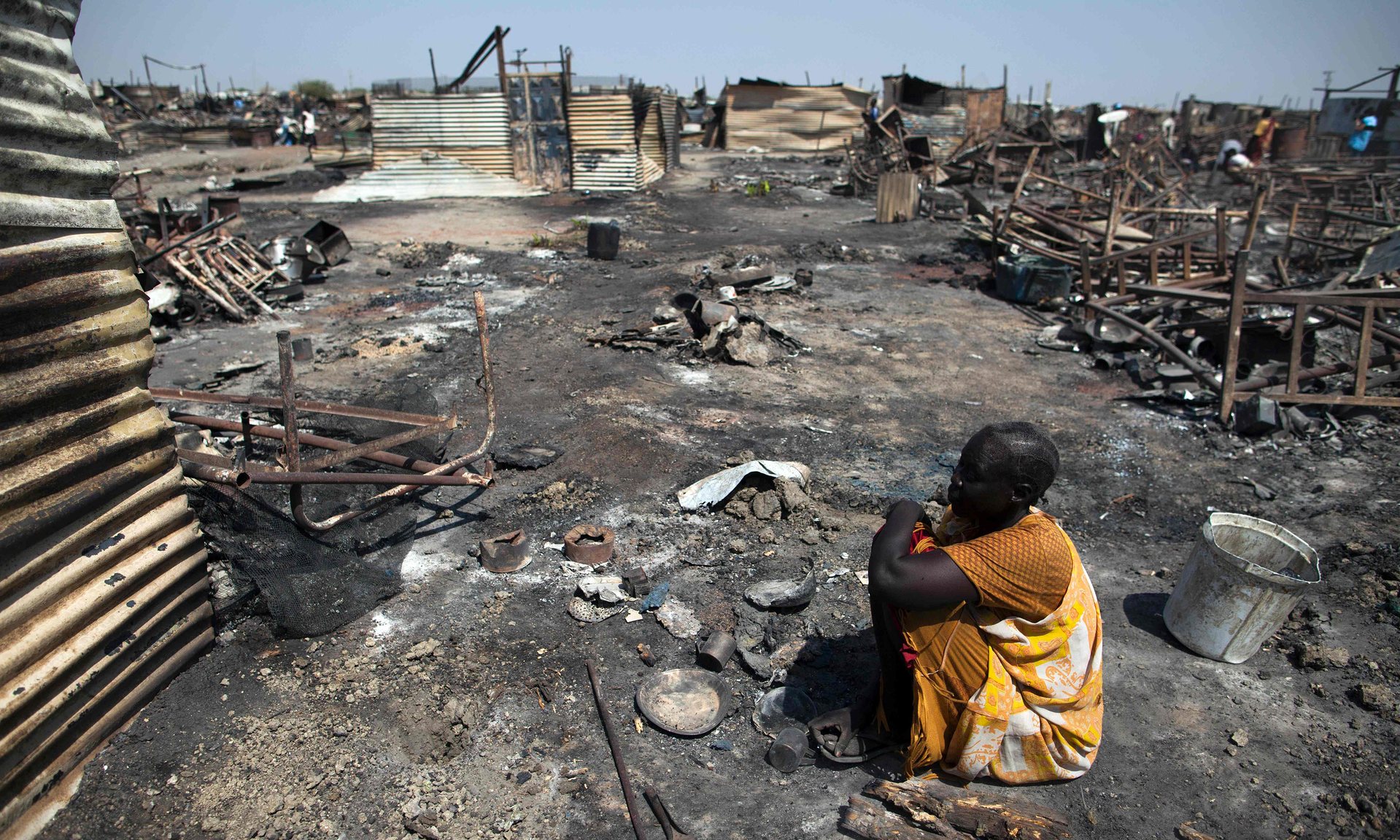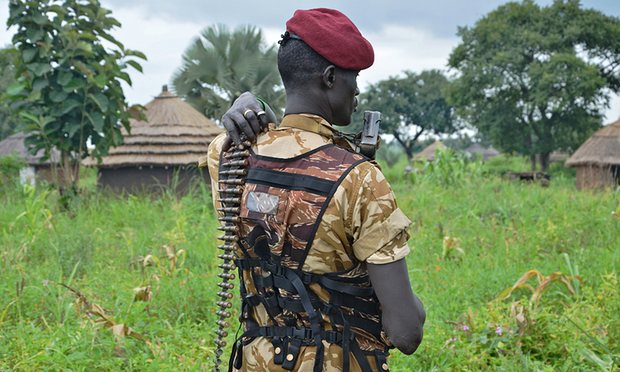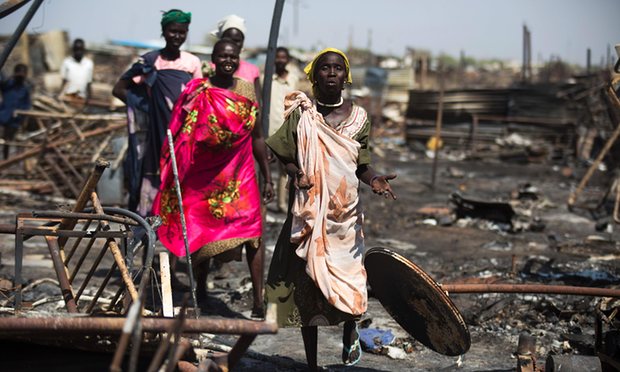PBS: Escaping Eritrea … [Read More...] about ካብ ውሽጢ ቤት ማእሰርታት ኤርትራ
Sam Jones |
"We don't take sides; we help you see more sides."

Published:
PBS: Escaping Eritrea … [Read More...] about ካብ ውሽጢ ቤት ማእሰርታት ኤርትራ
Sam Jones |
Scale of atrocities committed by both sides laid bare in report, including allegations of torture, murder and deliberate mass displacement
The South Sudanese government has conducted a “scorched earth policy” against civilians caught up in the country’s civil war, allowing its soldiers and allied militias to rape women in lieu of wages, torture and murder suspected opponents and deliberately displace as many people as possible, according to a UN report.

The blunt and harrowing document, published on Friday by the Office of the UN High Commissioner for Human Rights (OHCHR), comes six months after accounts emerged revealing the systematic abduction and abuse of thousands of women and girls during the conflict.
The report laid bare the scale of the atrocities committed by both sides since the war broke out in December 2013 and warned that many of those may amount to war crimes or crimes against humanity. Most of the civilian casualties, it added, had been the result of deliberately targeted attacks rather than combat operations.
While the report found that all sides had committed “serious violations and abuses”, it was unequivocal in asserting that “the government appears to be responsible for the gross and systematic human rights violations”.
From April to September last year, the UN recorded more than 1,300 reports of rape in Unity state alone, an oil-rich area in the north of the country that has seen some of the worst violence of the conflict. In 2014, opposition forces harried towns in the area, turning churches, mosques and hospitals into “veritable traps for civilians”, the UN report said.
Although those forces scattered in 2015 in the face of an offensive waged by government troops in the Sudan People’s Liberation Army (SPLA), civilians were once again deliberately targeted.

The report chronicled how those suspected of supporting the opposition – including children and disabled people – were murdered by being burned alive, suffocated in shipping containers, shot, cut to pieces or hanged from trees.
One woman recounted being raped by five soldiers in front of her children; another was tied to a tree and forced to watch 10 soldiers rape her 15-year-old daughter. “If you looked young or good-looking, about 10 men would rape the woman; the older women were raped by about seven to nine men,” one witness explained.
The report noted that the prevalence of rape suggested that its use had become “an acceptable practice by SPLA soldiers and affiliated armed militias”. Its assessment team was told that youth militias who carry out attacks with the SPLA had an agreement – “do what you can and take what you can”.
The report added: “Most of the youth therefore also raided cattle, stole personal property, raped and abducted women and girls as a form of payment.” The UN high commissioner for human rights, Zeid Ra’ad Al Hussein, said that while South Sudan was “one of the most horrendous human rights situations in the world”, the situation was struggling to attract international attention.
“The scale and types of sexual violence – primarily by government SPLA forces and affiliated militia – are described in searing, devastating detail, as is the almost casual, yet calculated, attitude of those slaughtering civilians and destroying property and livelihoods,” said Zeid. “However, the quantity of rapes and gang-rapes described in the report must only be a snapshot of the real total.”
The government flatly rejected suggestions that SPLA soldiers have been involved in the human rights abuses detailed in the report. “We condemn in the strongest terms possible any crimes committed against civilians,” Ateny Wek Ateny, a spokesman for President Salva Kiir, told the Guardian.
He said that the atrocities may have been carried out by militias wearing SPLA uniforms but insisted government troops operated under “strict rules of engagement” that prohibit the targeting of civilians. Ateny added: “The government takes it very seriously and we are investigating to find who has committed these heinous crimes and as soon as we get those who are responsible for committing human rights violations, we will bring them to book.”
Lama Fakih, Amnesty International’s senior crisis adviser, said the report tallied with its own recent findings in Unity state. “It’s clear that South Sudan has a problem with its army and allied militias – who have been raping women and girls and leaving men and boys to suffocate to death in a shipping container,” she said.

“We are concerned that the people responsible for these atrocities are still in power, that the South Sudanese government has not taken action to hold those responsible accountable, and that victims have not as yet been compensated.
South Sudan, the world’s youngest country, has been consumed by conflict since December 2013, when President Kiir accused his former vice-president, Riek Machar, of plotting a coup. The fighting quickly tore the country apart along sectarian lines, pitting supporters of Kiir, an ethnic Dinka, against those backing Machar, an ethnic Nuer.
Two years of war are estimated to have killed at least 50,000 people and displaced a further 2.2 million, as well as pushing parts of South Sudan to the brink of famine and decimating an already weak economy.
Hopes that the peace deal signed last August – following dozens of shattered truces and repeated allegations of atrocities – might take hold rose slightly in February after Kiir used a presidential decree to restore Machar to the post of vice-president.
However, it remains to be seen whether Machar will return from exile to take up the role. Arrangements are currently under way to bring more than 1,300 of his security personnel to the capital, Juba.
The OHCHR report was released as the UN announced an investigation into the recent violence at its protection of civilians site (PoC) close to the ruined northern city of Malakal, which shelters almost 50,000 people.
At least 25 people – including two workers from the medical charity Médecins Sans Frontières (MSF) – were killed and 120 others injured in February when three days of fighting erupted in the PoC. The UN mission in South Sudan (Unmiss) is facing questions over its handling of the violence – not least about why it took so long to bring the situation under control when it had about 1,000 armed peacekeeping troops in and around the base.
Ellen Margrethe Løj, the special representative of the UN secretary general and head of Unmiss, said a high-level, independent UN board of inquiry was being set up to evaluate the mission’s handling of the episode.
She told the Guardian that while the fighting had initially erupted between members of different ethnic groups within the PoC, there was no doubt that individuals in SPLA uniforms had also entered the camp.
According to reports, the uniformed men shot at Shilluk and Nuer civilians, burned their huts and threw grenades. About 4,500 Dinka had already left the PoC to seek shelter in the city of Malakal, which is currently in government hands.
“We and the United Nations will do a thorough investigation as to what happened,” said Løj. “We’ll focus, not least, on how we behaved.” Løj rejected suggestions that the delay in putting down the violence had been caused because peacekeepers were unsure whether they were allowed to engage the attackers.
“Of course [peacekeeping troops] know they’re allowed to fire,” she said. “Of course they also get into a challenge – and I’ll have the investigators look at it – when military people have to shoot at civilians. That’s a delicate balance and that can be a difficult choice for them.
“But it is a Chapter VII mandate and I certainly repeated to them that they have to remember that protection of civilians – including protecting ourselves, actually – is the core of our mandate and it entails, if necessary, the use of force.” In December last year, MSF accused Unmiss of a “complete and utter failure” to protect civilians in Unity state.
MSF said that although civilians in the area had been subjected to murder, rape and abduction for many months, there had been a shocking lack of action from the UN mission.
Unmiss described those suggestions as unjustified, adding: “Under very trying circumstances, the UN mission has performed to the best of its abilities to mitigate abuses.”